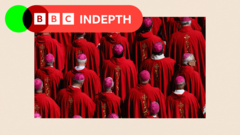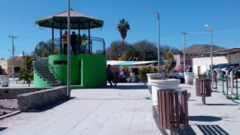With Pope Francis's legacy influencing the selection of his successor, cardinals are navigating a complex landscape marked by both support and dissent regarding the Church's direction.**
Emerging Divides Among Cardinals Ahead of Vatican Conclave**

Emerging Divides Among Cardinals Ahead of Vatican Conclave**
The upcoming conclave to elect the next pope showcases the differing perspectives shaping the future of the Catholic Church in a diverse global landscape.**
The Vatican prepares for a historic conclave on May 7, as cardinals converge upon the Santa Marta guesthouse to elect a new pope. Among the 128 rooms in the guesthouse, one remains closed, marked by a red ribbon in memory of Pope Francis who passed away earlier this year. His significant appointments and transformative vision for the Catholic Church loom large over this conclave, as approximately 80% of the participating cardinals were chosen by him during his 12-year tenure.
As cardinals engage in general congregations in the lead-up to the conclave, discussions reveal diverging views on the Church's future. While there seems to be a consensus that Pope Francis's progressive initiatives should be upheld, skepticism persists among traditionalists who fear a drift from long-held doctrines. The outcome remains uncertain as the Church grapples with reconciling its diverse needs worldwide.
This conclave is notable for its unprecedented diversity—new representations from nations like South Sudan, Myanmar, and Cape Verde at the forefront. The varied challenges faced by the Church, such as declining attendance in Europe versus pressing social issues in Africa and Asia, are brought to light in these discussions. The ideal candidate should not only be a spiritual figure but also a pragmatic leader adept at navigating these complexities.
The multifaceted role of the pope bridges religious and statecraft responsibilities, as the Holy See holds substantial influence despite being the world’s smallest sovereign entity. Pope Francis utilized his papacy to advocate for marginalized voices, emphasizing respect for migrants and the urgency of climate change, extending his reach far beyond traditional religious confines.
However, opinions about his legacy are mixed. Some cardinals express concern that the pope’s reforms may not be uniformly realized across the Church. Feedback surfaced during pre-conclave meetings indicated a desire for stronger, clearer directions regarding women’s roles and inclusion of LGBT+ community members—a reflection of diverse global Catholic sentiment.
As the cardinals prepare for the election, a palpable tension exists between the factions supportive of and opposed to Pope Francis’s progressive stance. Many are calling for a durable approach that can bridge existing divides, focusing on fostering unity within the Church in its mission to serve today's faithful.
In the sacred space of the Sistine Chapel where the voting will take place, cardinals will seek divine guidance amidst the complexities of modern Church governance while guided by love for faith and the steadfast commitment to their duties as spiritual leaders. In doing so, they hope to find a successor who can continue the work of transformation, fostering inclusivity within a rapidly evolving global landscape.




















